Related Research Articles
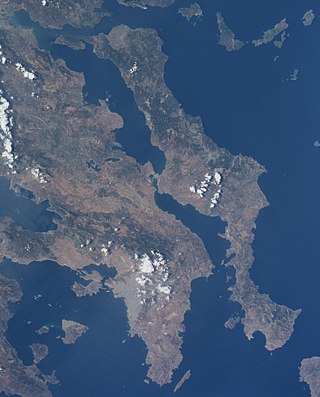
Euboea, also known by its modern spelling Evia, is the second-largest Greek island in area and population, after Crete, and the sixth largest island in the Mediterranean Sea. It is separated from Boeotia in mainland Greece by the narrow Euripus Strait. In general outline it is a long and narrow island; it is about 180 km (110 mi) long, and varies in breadth from 50 km (31 mi) to 6 km (3.7 mi). Its geographic orientation is from northwest to southeast, and it is traversed throughout its length by a mountain range, which forms part of the chain that bounds Thessaly on the east, and is continued south of Euboia in the lofty islands of Andros, Tinos and Mykonos.

Xanthi is a city in the region of Western Thrace, northeastern Greece. It is the capital of the Xanthi regional unit of the region of East Macedonia and Thrace.
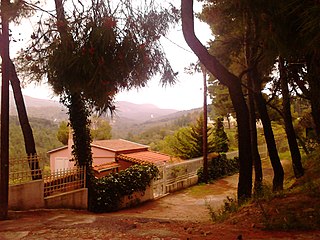
Acharnae or Acharnai was a deme of ancient Athens. It was part of the phyle Oineis.

Kamatero is a town and a suburb in the central-western part of the Athens agglomeration, Greece. Since the 2011 local government reform it is part of the municipality Agioi Anargyroi-Kamatero, of which it is a municipal unit. It is located about 8 kilometres north of Athens city centre.

Komotini is a city in the region of East Macedonia and Thrace, northeastern Greece and its capital. It is also the capital of the Rhodope. It was the administrative centre of the Rhodope-Evros super-prefecture until its abolition in 2010, by the Kallikratis Plan. The city is home to the Democritus University of Thrace, founded in 1973. Komotini is home to a sizeable Turkish speaking Muslim minority. They were excluded from the 1923 population exchange. According to the 2021 census, the municipality of Komotini had population of 65,243 citizens.
Krokodeilos Kladas, also known as Korkodeilos, Krokondeilos, or Korkondelos, was a military leader from the Peloponnese who fought against the Ottomans on behalf of the Republic of Venice during the late 15th century.
The Thessaloniki Metro is an underground rapid-transit system in Thessaloniki, Greece's second largest city. Estimates for the cost of the megaproject are €1.62 billion ($1.83 billion) for the main line and €640 million ($723 million) for the Kalamaria extension, for a total of €2.26 billion ($2.55 billion). The project is primarily funded with loans from the European Investment Bank (EIB) and the European Regional Development Fund (ERDF) and funds from the Greek government. Construction by a Greek-Italian consortium is overseen by Elliniko Metro S.A., the Greek state-owned company which oversaw construction of the Athens Metro and Athens Tram. It will operated by the Thema S.A. Franco-Italian consortium.
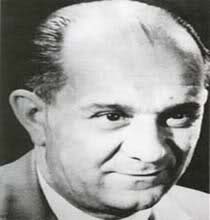
Nikos Tsiforos was a Greek humorist, screenwriter, and film director. He had more than 60 film scripts to his credit between 1948 and 1970. He further directed 17 films between 1948 and 1961.
Eleftheroupoli F.C., officially known as A.E. Eleftheroupoli, the "Athletic Union of Eleftheroupoli", is a Greek association football club based in Nea Ionia, a suburban town in the Athens prefecture, Greece. The club currently competes in the Athens Second Division.
Panagiotis V. Faklaris is a Greek archaeologist, professor of classical archaeology and excavator of the acropolis and the walls of Vergina. Main fields of specialization: topography of ancient Macedonia, topography of ancient Kynouria, arms and armour, horse harnesses, ancient Greek daily life, metal finds, Greek mythology. Studied archaeology at the Aristotle University of Thessaloniki and the University of Cambridge UK. Born in Arcadia, Greece, April 1947. Assistant (1978–1992) of the famous Greek archaeology professor Manolis Andronikos. Member of the Athens Archaeological Society since 1986. Member of the Greek Folklore Society since 1977. Founding member of the Association for the Study of Ancient Greek Technology (EMAET).EMAET Member of the Historical and Epigraphical Studies Society. Member of the Peloponnesian Studies Society. Εταιρεία Πελοποννησιακών Σπουδών Founding member of the Arcadian Academy.
A.O. Nea Ionia F.C, officially known as Nea Ionia, the "Athletic Union of New Ionia", is a Greek association football club based in the city of Nea Ionia, Greece. The club currently compete in the Athens First Division.
Anastasios Orlandos was a Greek architect and historian of architecture.
Ioanna-Maria Gertsou is a representative of the Greek guide dog movement, through "Lara Guide-Dog School" a non - profit organisation that she co-founded in 2008. She is visually impaired due to retinopathy of prematurity. She is mostly known as "Lara" is the first guide dog related organisation of Greece. She is an activist, promoting human diversity, guide dog access, physical and electronic accessibility and animal rights.

Eleni Vakalo was a Greek poet, art critic and art historian.
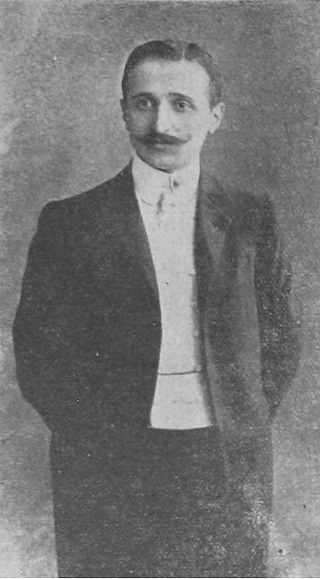
Sofoklis Avraam Choudaverdoglou-Theodotos also known simply as Sofoklis Choudaverdoglou, was an eminent Greek scholar, historian, stenographer and a member of the Ottoman Parliament.
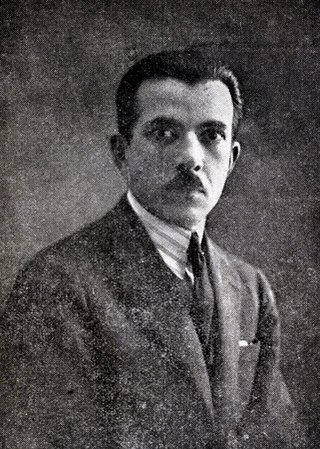
Gregorios Zevgolis was Greek sculptor and painter, originating from Naxos.

Eftychia "Effie" Achtsioglou, is a Greek politician who served as Minister for Labour, Social Insurance and Social Solidarity from 2016 to 2019. She is a member of the Hellenic Parliament since July 2019 and a leading figure of the New Left since December 2023. She was a member of SYRIZA and an MP for the party until she left in November 2023.

Faik Pasha Mosque, also known locally as the Imaret of Arta, is a historical Ottoman building located in the town of Arta, Epirus, in Greece. Named after the Ottoman conqueror of the city in 1449, the mosque formed a complex including baths, an imaret and a madrasa. It is one of the two surviving mosques in Arta, the other being the Feyzullah Mosque. It is under renovation works and is not currently open for worship.
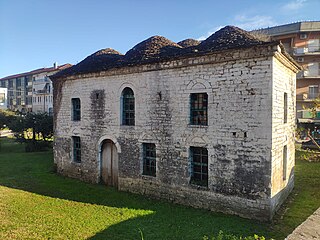
The Veli Pasha Mosque is an Ottoman building located in the Greek town of Ioannina, in the northwest region of Epirus. The mosque was renovated at the turn of the 19th century by Veli Pasha of Ioannina and formed a complex consisting in particular of a madrasa and kitchens. Today it is no longer open for worship.
Georgios Sotiriou or Soteriou he was a Byzantinist, archaeologist, curator and later head of the Byzantine and Christian Museum in Athens.
References
- ↑ Moschonas 1996, pp. 137ff..